DGA is a top rated Digital Marketing Agency near Austin,Texas.Provide digital and white label online marketing services for startups & SME’s powering them to growth
White Label Digital Marketing Agency. Whether you’re looking to enhance your SEO game or give your online presence a boost with website marketing services, sweep the board at social media marketing or create email funnels that sign you up for success – CANZ Marketing can do it all for you (or your clients)!
Black Propeller is an industry-leading digital marketing agency specializing in PPC management. We are passionate about helping other businesses dominate their markets with PPC advertising. Our PPC agency was founded in 2011 and since then we have grown to manage more than $1,000,000 in PPC advertising annually for our clients.
Hillside Digital Marketing is an up and coming full-service Bradenton digital marketing company with a mission to help local businesses thrive online. Our goal is to create a partnership with our clients business that allows them to keep up with the ever changing digital marketing world and ultimately attain and surpass their goals.
At Ocean Epic we offer cutting edge tactics in search engine optimization and social media marketing, and web design. We help businesses increase exposure by dominating in search results, growing businesses customer base, and increase revenue from new customer inquiries.
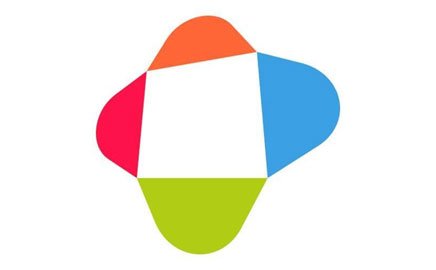
Help your brand become the first choice by having well designed, professionally coded website with healthy SEO activities and PPC advertising campaigns. Our design, development, and copy team will combine their efforts to present your business in the perfect light.
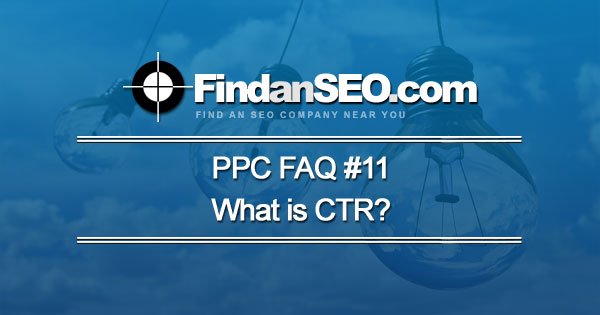
CTR or Click-Through Rate is a metric (displayed as a percentage) used in both SEO and PPC circles to measure relative performance.
Clicks / Impressions = CTR%
In SEO, it’s the number of times your organic listing is clicked divided by the number of times your organic listing has been viewed (impressions) in a SERP.
In PPC, it’s the number of times your ad is clicked divided by the number of times your ad was displayed (impressions) for a specific search.
How does CTR relate to Paid Search (PPC)?
CTR is important to paid search efficiency because it directly affects the Quality Score for your PPC keywords.
Google, Bing, and other paid search platforms will typically offer a lower cost per click for keyword/ad combinations that offer high quality and highly relevant user experience.
How does CTR relate to SEO & Organic Search?
CTR isn’t officially a ranking factor for organic search but there has been some chatter lately saying that it’s probably going to be one soon. Here are a few articles that will tell you why.
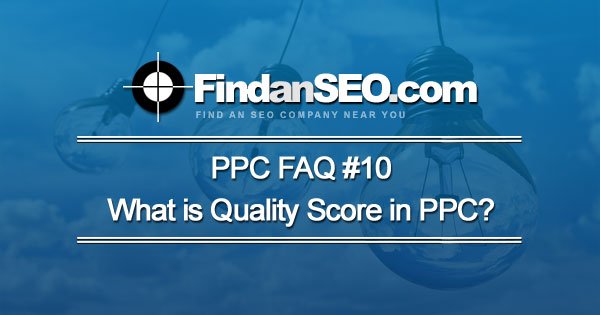
Quality score is a rating (Created by Google with similar systems in Bing & Yahoo) that measures the relevance of your pay-per-click ads, keywords, and landing pages. The amount you ultimately pay for every click will be determined by this rating and your maximum bid (also known as ad rank).
Here is the equation Maximum Bid + Quality Score = Ad Rank. Ad rank determines how much you pay per click.
What makes up your quality score?
So let’s breakdown the specifics of quality score. What are the factors that determine the quality of your ads, keywords, and landing pages?
- Expected CTR – having a high CTR is a good indication that searchers have found your ads to be relevant to their search queries. This is the most important factor in the equation. If Google shows the most relevant ads possible (with the highest CTRs), they will get more clicks and make more money. The advertiser will get more volume and a lower cost per click.
- Ad Relevance – Are your ads relevant to the keywords you are bidding on? Do your ads and the corresponding landing page match the search query? To achieve the highest ad relevance scores make sure that the keywords in each ad group have the keywords you are targeting in them.
- Landing Page Quality – Does your landing page match the message of your ad and the corresponding keyword? Landing page quality takes into account several factors including keyword relevance as well as how visitors act on your page (bounce rate, time on page, etc.).
Google doesn’t disclose how much each factor contributes to your overall quality score but click-through rate is widely considered to be the most important.
How do you increase your quality score?
Quality score is a crucial factor in determining how well your ads perform and how much you’ll ultimately pay per click. Focusing your efforts in the areas below will help increase your quality score.
- Keywords and Ad Groups – Every ad group you create should have keywords that are as close in meaning as possible to ensure your ads are as relevant as possible.
- Ad Text – Changes in ad copy that include the keywords you are bidding on will go along way towards increasing expected CTR. DKI (dynamic keyword insertion) is one way to make sure your keywords are included in your ads.
- Landing Pages – Where do visitors go when they click on your ads? Does it closely match what your ads trying to say? Are your targeted keywords included on the page? These are questions that must be answered in order to give your visitors the best experience possible and get a high “Landing Page Experience” score from Google.
- Negative Keywords – Anything other than an “exact match” can potentially generated unwanted search queries. Making sure you have negative keywords in place that prevent unwanted impressions will help increase overall CTR.
Improving your keyword Quality Score comes down to structuring your PPC campaigns into small, well-organized, ad groups that consist of tightly knit keywords, ads, and landing pages.
If a searcher enters a query that triggers your ad and all of these elements are in place, you’re probably going to make them happy because you’ll be providing exactly what the searcher is looking for.
Where do you find your keyword quality score in Adwords?
Every keyword that is targeted on the search network has a quality score. To find individual keyword quality scores follow these steps:
- Go to the “Keywords” tab in any ad group or campaign.
- Click the “Columns” dropdown and then “Customize columns”.
- A “Modify Columns screen appears with a “Quality Score” option.
- Choose “Quality Score” and then click “Apply” to save.
- You should now have a quality score column included in your keywords.
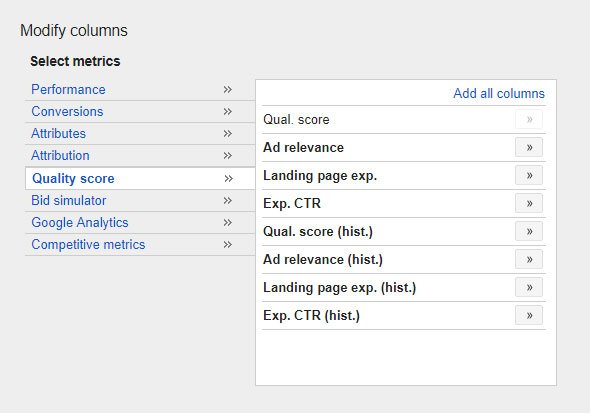
Google also gives you the opportunity to see exactly how they determine your quality score by showing you the score of your keyword based on CTR, ad relevance, and landing page experience. To see this data simply go to any keyword in any ad group and scroll over the status column “icon speech bubble”. You should see something like this:
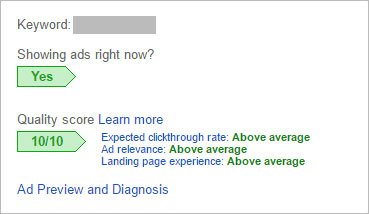
How does Google treat quality score on the search network? Display network?
Quality score is calculated on both the search network and display network every time your ad is eligible to run in the auction, however, quality score on the Google Display Network is calculated a bit differently.
Your quality score on the Google display network depends on several factors including your targeting (automatic or managed placements) as well as how you bid for placement (CPM or CPC). Historical CTR of the ad and landing page quality are typically the go to metrics if keywords are taken out of the equation.
One important thing to remember when comparing networks. Your search quality score and display quality score are calculated separately and one does not affect the other.
Conclusion
Quality score is an important factor in PPC and goes a long way towards determining how much your ads get shown and how much you pay per click. Knowing what quality score is and how it can be improved will ultimately help you lower CPC, CPA, and increase ROI.
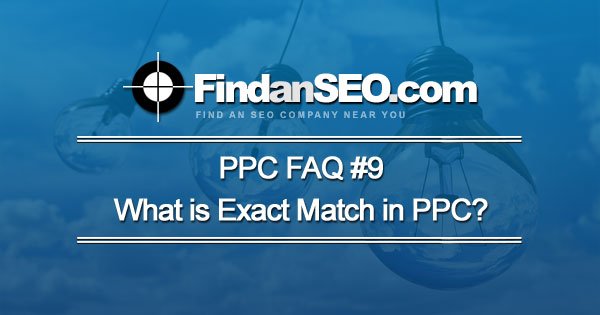
Exact match is a keyword matching option within PPC platforms (Google Adwords, Bing, Ads, and Yahoo). It is the most focused keyword matching option that allows advertisers to target specific keywords that exactly match user queries (and close variants). Most PPC platforms set exact match keywords in brackets like this [exact match keyword].
So if you bid on the exact match keyword [red running shoes], you should expect to see search queries that match that keyword as well as close variants, misspellings, and plurals. A few examples of what could come up include:
- red running shoes
- red running shoe
- red runner shoes
- red runner shoe
- red running sohe
- red runnin shoe
What did Google change in 2017 for exact match keywords?
In the past exact match keywords prevented search queries that didn’t exactly match your keyword. Google’s recent change should shake things up a bit and allow keywords in a different order as well as prepositions, conjunctions, and articles to be included in exact match eligible queries.
So, using the example above, there will be even more eligible queries for the exact match keyword [red running shoes]. Some of the new queries might include.
- red running shoes
- running shoes red
- shoes running red
- red shoes for running
Google estimates that this change would boost exact match traffic by close to 3%.
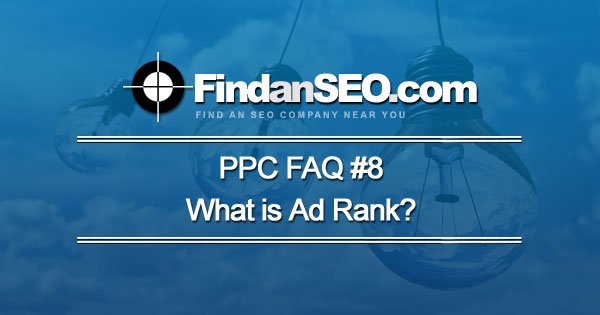
Ad Rank is a paid search (Google Adwords) term used to describe where your ad appears in a pay-per-click (PPC) auction.
Ad Rank is recalculated every time your ad is eligible to appear using:
- Bid Amount
- Quality Score
- Expected CTR
- Ad Relevance
- Landing Page Quality
Bid + Quality Score = Ad Rank
By using the combination of these two metrics, your ads will have a chance to appear even if your bid isn’t the highest. The quality of your ads goes along way towards securing a top spot in the ad auction.
How can you improve your Ad Rank?
So let’s say you don’t have the highest bid. How can you improve your ad rank? There are three quality components that will allow you to jump your competition.
- Expected CTR: The history of your clicks and impressions.
- Ad Relevance: How relevant your ad text is to the search.
- Landing Page Quality: How accurately your landing page matches the user’s search and the ad they clicked on.
Example: You are bidding on the keyword “red running shoes”. Your ads headline reads, Red Running Shoes on Sale. If someone clicks on your ad they are taken to a category page that displays a variety of red running shoes. In that situation your ad rank will typically be high allowing you to possible win the ad auction with a below average bid.
Wouldn’t showing ads with the highest bid make Google more money?
Not necessarily, by introducing ad quality components to the ranking equation, Google essentially leveled the playing field. So as long as the quality of your ads is high (with a high CTR) and generates more revenue than lower quality ads, Google has an incentive (they make more money) to keep your ads at the top.
When the ads Google shows are relevant and closely match what customers are looking for, it usually equates to lower overall costs, better ad positions, more ad success for the advertiser, and more money for Google.